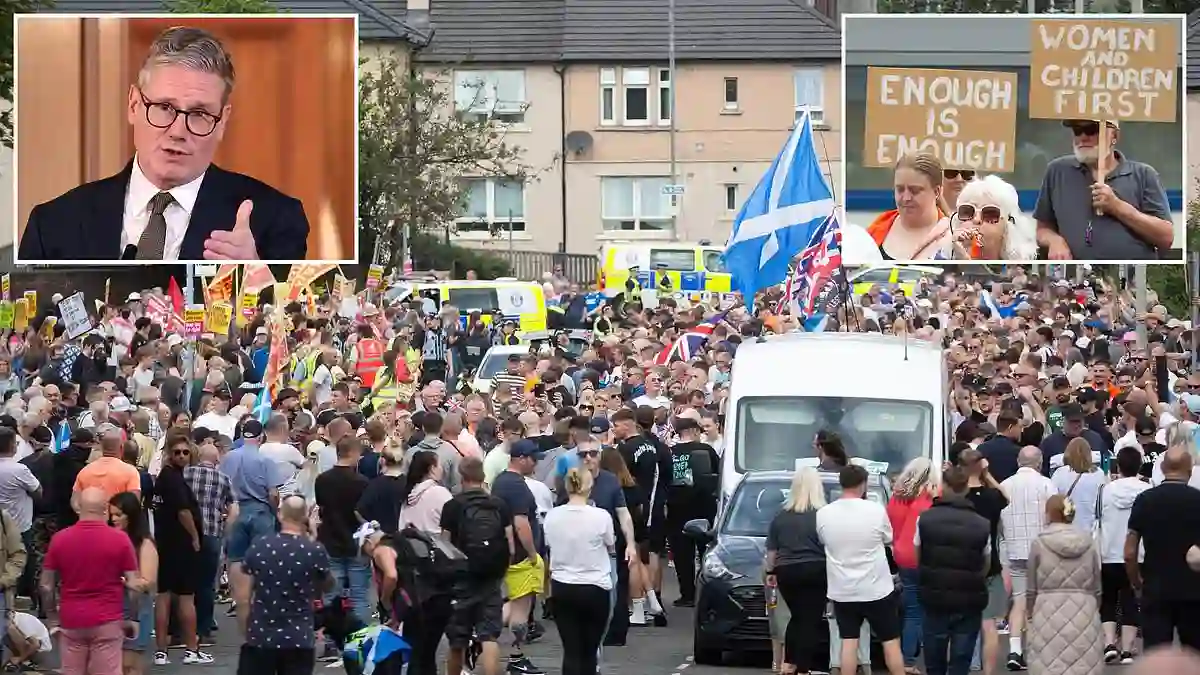What began as simmering frustrations in a Scottish town exploded into street clashes outside a migrant hotel in Falkirk.
On Saturday night, around 700 people – split between angry locals and anti-racism campaigners – confronted each other outside the Cladhan Hotel, which currently houses asylum seekers.
Police were forced to call in reinforcements as bottles and objects were hurled during heated scenes.
The unrest reflects growing tension around the use of hotels to accommodate migrants, an issue that has been stirring up political and community debates for months.
The Case That Sparked Outrage
Anger in Falkirk has been heightened since June, when Afghan asylum seeker Sadeq Nikzad, 29, a former resident of the Cladhan Hotel, was jailed for raping a 15-year-old local schoolgirl.
He was handed a 12-year extended sentence at the High Court in Livingston for what the judge described as an “appalling, opportunistic attack.”
Nikzad, who entered the UK illegally on a small boat, repeatedly shouted “liar” at the judge during sentencing and claimed he had not been educated on cultural differences.
He is expected to be deported once his prison sentence is completed.
Local Voices and Community Fears
For many Falkirk residents, the conviction has intensified long-standing fears about safety.
Protesters gathered under banners of groups such as Save Our Future and Our Kids’ Future.
Darren, a local father, voiced his worries: “There are kids getting followed home and it all leads back to here.
And it’s not just young lassies, it’s boys as well.”
Connor Graham, another father, told the crowd through a megaphone: “We are not going away.
We are not going to be intimidated into silence. ]We want a safer Falkirk. We want answers and action, and a community where our children can grow up safe.”
Counter-Protests Push Back
On the other side, counter-protesters from Stand Up to Racism gathered to challenge what they saw as rising intolerance.
Claire Love, a 42-year-old social worker, said she feared there had been “an increase in racism, homophobia and xenophobia in recent times.”
The stark divide on the streets shows just how emotionally charged the asylum debate has become in Falkirk and beyond.
Political Pressure on Starmer
The unrest has put Prime Minister Sir Keir Starmer under pressure to act.
Falkirk’s own Labour MP, Euan Stainbank, admitted the hotel was not a long-term solution.
“These hotels don’t work for host communities or those who stay there,” he said, promising the government would phase them out.
Scottish Conservative Community Safety spokeswoman Sharon Dowey went further, demanding Labour “heed the concerns of local communities” and deliver “an alternative solution” quickly.
She argued locals had “legitimate safety concerns for themselves and for their children.”
A Wider Pattern Across the UK
The Falkirk demonstration mirrors similar protests in England.
Earlier this week, the Bell Hotel in Epping, Essex, became a flashpoint, leading the local council to seek a temporary block on taking in more asylum seekers.
If courts back the council’s move, other communities – including Falkirk – could attempt similar legal challenges.
What the Government Says
The Labour government insists it is working to fix the “broken asylum system” it inherited from the Conservatives.
Officials highlight that the asylum backlog has already been reduced by more than 59,000 cases since 2024.
A Home Office spokesperson stressed progress: “From over 400 asylum hotels open in summer 2023, costing almost £9 million a day, there are now fewer than 210, and we want them all closed by the end of this Parliament.”
The Bigger Picture
Recent polling suggests the mood in Scotland is firmly leaning towards tighter immigration controls, with 77% of voters saying they want immigration to decrease or stay at current levels.
For Falkirk, the protests may just be the beginning.
The government’s next moves – whether in closing hotels or finding alternatives – will be closely watched, not only in this Scottish town but across the UK.



